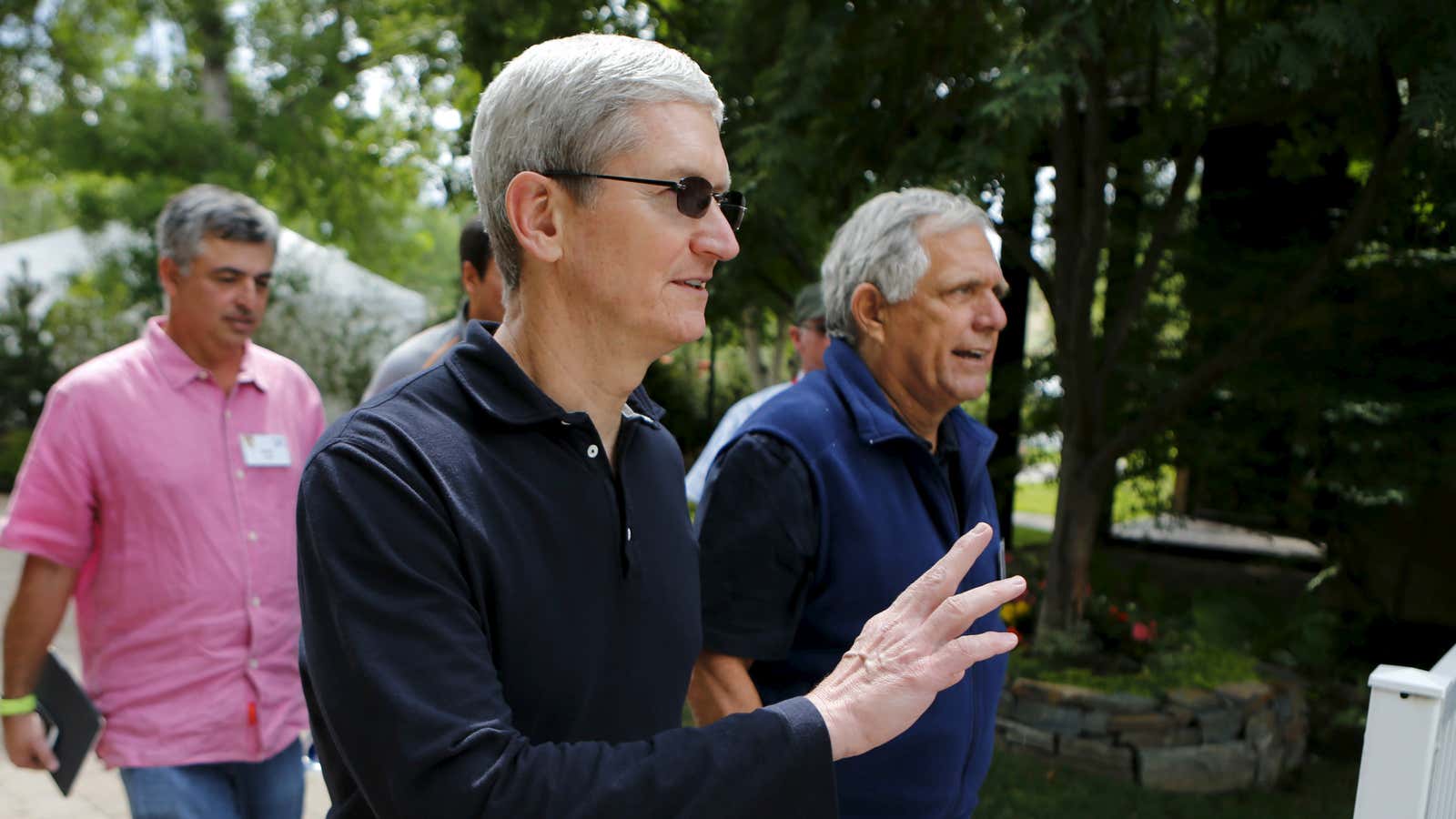The US news program 60 Minutes aired a lengthy segment on Apple on Sunday (Dec. 20) and the results were typically unremarkable.
Host Charlie Rose interviewed CEO Tim Cook and a host of others in the Apple hierarchy. Like most interviews with Apple, when serious issues were touched upon, executives avoided the subject using the company’s favored tactic—talking about how great Apple is. The result was a wealth of missed opportunities to de-mystify the company.
Missed opportunity #1
A perfect example comes at the beginning of the segment, where Rose makes an appearance at the company’s weekly executive meeting. Apple Music boss Eddie Cue tells 60 Minutes the following:
It’s amazing to be able to work at a place where you’re making products that everybody in the world uses. Whether it’s a two-year-old or a 100-year-old, they get to experience the products that we’re building, and that’s amazing.
The iPhone is a great product, but it’s not the only product used by both two-year-olds and 100-year-olds. A Samsung phone could be used by a two-year-old and a 100-year-old. So could a television, or a Hershey’s chocolate bar. What makes creating an Apple product different from those?
Missed opportunity #2
We then pivot to Jobs’ legacy. When asked if Steve Jobs’s DNA is “baked into everything [Cook] says,” Tim Cook responds predictably with a yes, seizing the opportunity to emphasize Jobs’ influence:
This is Steve’s company. It is still Steve’s company. It was born that way, It was still that way. So his spirit will I think always be at the spirit of this company.
Most people are aware of Jobs’ charisma and unusual attention to perfection. But what about Cook’s legacy? To what extent has he made decisions that Jobs wouldn’t have made?
Missed opportunity #3
Rose then pops into Jony Ive’s design studio, the hub for where new Apple products are prototyped, known for its secrecy. When Rose asks why some of the tables are covered in black cloth, Ive responds:
[Because] You’d know what we’re working on next. That’s one of the reasons why it’s extraordinarily rare for people to come into the design studio.
Everyone knows that Apple is secretive. But how would the company be different if it weren’t? To what extent is this secrecy a strategic decision, vital to the company’s ongoing success? Ive also talked about choosing the size of the iPhone 6 and 6 Plus:
We chose these two partly because they felt right. They somehow… not from a tactile point of view, but just emotionally it felt like a good size.
What is an emotional feel? Everyone knows that Apple is attentive to design. But how does the curve or weight of a phone specifically affect one’s perception of its value?
Missed opportunity #4
Rose later moves back to Cook and discusses the Apple Watch. Rose and Cook engage in an awkward exchange in which the reporter tries to get Cook to hint at its possible failure.
Rose: Do you think it’s a product that needs improvement?
Cook: I think every product needs improvement, and the watch is no exception that.
Rose: So you were disappointed in some of the things?
Cook: I’m not disappointed in it, but…
Rose: But you saw room to improve it
Cook: Charlie, when we launch a product, we’re already working on the next one and possibly even the next next one. So yes, we always see new things we can do.
Cook will never reveal to the media that the watch has been a failure. A better approach to this bit might have been to ask Cook about the ways consumers are using it, and how that matched against the company’s early expectations.
Ultimately though, Apple’s leadership chooses their words so carefully with the media that any attempts to steer them towards thoughtful responses usually elicits the same result—fevered enthusiasm. Apple is a fascinating company to follow, but not the most exciting one to listen to.
